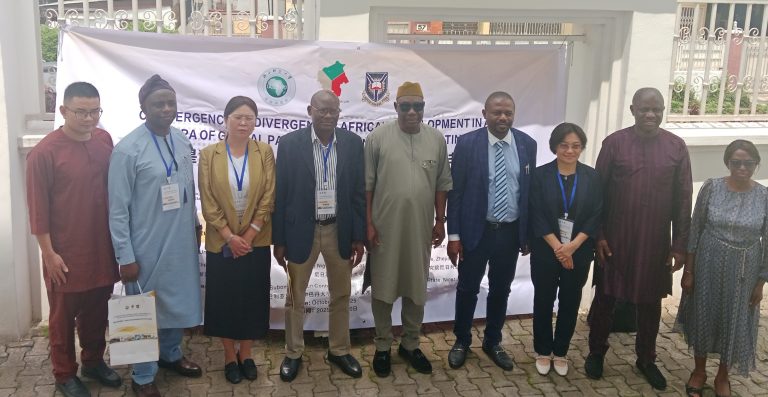His Excellency, Engr. Seyi Makinde FNSE, Executive Governor of Oyo State, today delivered a powerful keynote address urging African nations to leverage the benefits of their cooperation with China while strategically safeguarding their long-term interests against potential pitfalls. Speaking through his Deputy Governor Barrister Bayo Lawal at the Ibadan Forum 2025, organized by the Department of History, University of Ibadan, the Governor presented a balanced view of the growing African-China relationship under the headline: “African-China Cooperation: Advancing African Development in An Era of Global Partnership and Shared Destiny.”
Shared History, Shared Future Philosophy
Governor Makinde began by noting the shared, yet divergent, colonial histories of China and many African countries. He highlighted China’s extraordinary rise to world power despite suffering suppression from four different nations. He stressed that China’s engagement in Africa is framed not by a desire to repeat the ills of colonization but by a philosophy of mutual partnership and support for economic growth.
The Governor attributed the robust nature of this relationship to President Xi Jinping’s philosophy of a global community of shared future, which views all countries as interdependent. He outlined the five points anchoring this philosophy, emphasizing the need for equal partnerships, joint security efforts, inclusive development, inter-civilization exchanges, and prioritizing green development. He also recalled President Jinping’s five goals for the world, notably building a world of lasting peace and common prosperity through win-win cooperation.
China’s Expansive Role in African Development
His Excellency detailed China’s extensive interventions across the continent, which demonstrate a commitment to pushing this global agenda:
Infrastructure: China is now the largest funder and builder of African infrastructure projects, with 52 African countries signed onto the One Belt One Road Initiative. Noteworthy projects include the Mombasa–Nairobi Standard Gauge Railway in Kenya, major hydroelectric power stations in Uganda, and the Abuja-Kaduna railway line in Nigeria. A McKinsey & Company report estimates that over 10,000 Chinese-owned firms operate in Africa.
Finance: Between 2000 and 2023, Chinese lenders provided 1,306 loans totaling $182.28 billion to 49 African governments, with Angola, Ethiopia, Egypt, Nigeria, and Kenya being the top recipients.
Health: China’s health support, dating back to the 1960s, includes the deployment of medical teams, donations, training, and the construction of over 130 health facilities, such as the Africa Centers for Disease Control and Prevention headquarters in Ethiopia.
Security: China has become a leading arms supplier and increasingly influential security partner, training roughly 2,000 African officers annually and having joint drills with African forces.
Trade: Total trade volume between Africa and China reached approximately $296 billion in 2024. However, the Governor noted a significant imbalance, with Africa recording a $59 billion trade deficit in 2024. He acknowledged China’s implementation of a zero-tariff policy on products from diplomatically-tied African nations as an effort to reduce this burden.
The Perilous Edge: Debt-Trap and Neo-Colonialism Concerns
While acknowledging the vital support China provides to a continent plagued by poverty and high mortality rates, Governor Makinde sounded a note of caution regarding the relationship’s “downside,” specifically the debt-trap conundrum and the fear of indirect neo-colonialism.
He warned that many African countries are already using over 50 per cent of their revenue to offset existing debts.
Failure to meet the repayment terms for Chinese loans could severely impact funds for crucial sectors like education and health. The Governor recalled the International Monetary Fund’s (IMF) past advice for African nations to be cautious of Chinese loan terms that may not conform to Paris Club arrangements.
Furthermore, he addressed the geopolitical implications, noting that African countries could be reduced to pawns in diplomatic brawls between superpowers like China and the West. He argued that minimizing dependence is essential to avoid being drawn into “proxy wars.”
Africa’s Path to Self-Reliance and Prosperity
To secure its destiny, Governor Makinde proposed four critical steps African countries must take:
Invest in Human Capital: African nations must emulate the intentional investments of Asian countries by drastically improving their education and health systems to break the yoke of underdevelopment and dependency.
Invest in Infrastructure and Security: To move beyond aid and attract necessary trades and investments, Africa must prioritize infrastructure development and improved security.
Embrace Social Inclusion: Development must be all-encompassing, ensuring no citizen, including those with disabilities, is left behind.
Establish Strong Institutions: The most critical challenge is weak institutions.
Predictability, which strong institutions guarantee, is vital to attracting investible funds and high-quality talent, leading to sustained growth.
Oyo State as a Model for Sustainable Development
Governor Makinde concluded by highlighting the success story of Oyo State as a practical example of his proposed strategy. He affirmed the state’s focus on investing in its people, infrastructure, and institutions to guarantee sustainable development. This intentional approach has seen the state’s Internally Generated Revenue (IGR) grow from an average of N1.6 billion monthly in 2019 to about N6 billion monthly in 2025, significantly scaling down poverty and leading to Oyo State being rated the most liveable state in Nigeria.

